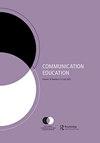研究生和院系努力塑造冒名顶替现象和同化的综合模式
IF 0.8
Q3 COMMUNICATION
引用次数: 0
摘要
本定性研究探讨了研究生(124 人)与冒名顶替现象(IP,俗称 "冒名顶替综合症")斗争的沟通过程,以及他们在与他人沟通时的心理状态。本文章由计算机程序翻译,如有差异,请以英文原文为准。
An integrated model of graduate student and departmental efforts shaping impostor phenomenon and assimilation
This qualitative study examines communicative processes associated with graduate students (N = 124) in their struggles with the impostor phenomenon (IP, commonly known as impostor syndrome) and the...
求助全文
通过发布文献求助,成功后即可免费获取论文全文。
去求助
来源期刊

COMMUNICATION EDUCATION
EDUCATION & EDUCATIONAL RESEARCH-
CiteScore
3.10
自引率
34.80%
发文量
47
期刊介绍:
Communication Education is a peer-reviewed publication of the National Communication Association. Communication Education publishes original scholarship that advances understanding of the role of communication in the teaching and learning process in diverse spaces, structures, and interactions, within and outside of academia. Communication Education welcomes scholarship from diverse perspectives and methodologies, including quantitative, qualitative, and critical/textual approaches. All submissions must be methodologically rigorous and theoretically grounded and geared toward advancing knowledge production in communication, teaching, and learning. Scholarship in Communication Education addresses the intersections of communication, teaching, and learning related to topics and contexts that include but are not limited to: • student/teacher relationships • student/teacher characteristics • student/teacher identity construction • student learning outcomes • student engagement • diversity, inclusion, and difference • social justice • instructional technology/social media • the basic communication course • service learning • communication across the curriculum • communication instruction in business and the professions • communication instruction in civic arenas In addition to articles, the journal will publish occasional scholarly exchanges on topics related to communication, teaching, and learning, such as: • Analytic review articles: agenda-setting pieces including examinations of key questions about the field • Forum essays: themed pieces for dialogue or debate on current communication, teaching, and learning issues
 求助内容:
求助内容: 应助结果提醒方式:
应助结果提醒方式:


